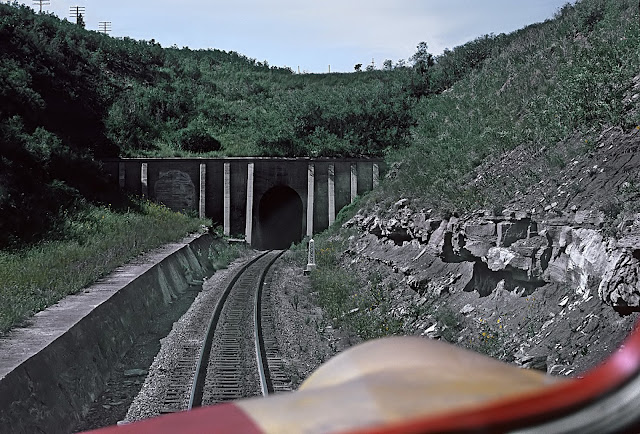West Portal: (Bridge Hunter; Satellite)
"Built 1879; second tunnel built 1908; original bore closed 1953." [BridgeHunter] It is the highest point on the Sante Fe at 7588' [UncoverColorado]
The Santa Fe and Denver & Rio Grande Western not only fought for the route through the Royal Gorge, they fought for this pass from Colorado to New Mexico. This was the Santa Fe's original route to California. But it has grades as high as 4% in Colorado. Santa Fe completed the 200+ mile Belen Cutoff in 1907, which has easier grades and is more direct. The now closed 1879 tunnel was 2,041' long. The 1908 bore was 2,787' with an approach grade of 0.158% instead of the 1.9% grade for the original bore. [american-rails] Since BNSF has moved its through freight operations to the cutoff, it doesn't want to maintain this route for passenger speeds. But, of course, Amtrak does want BNSF to maintain it. That is why I added the Amtrak label to these notes.
 |
| Bob Chaparro posted Raton Tunnel A post by David Dickinson on the Facebook Railroad Postcards group. He comments: Wording on the back of the post card: "Raton Tunnel, the highest point on the Santa Fe, has an altitude of 7,622 feet. The tunnel is 15 miles beyond Trinidad. The Santa Fe has recently completed a second tunnel considerably below the original tunnel." Notice the cattle drive happening on the right. Published for Fred Harvey by the Detroit Publishing Company. Built 1879; second tunnel built 1908; original bore closed 1953. Bob Chaparro Hemet, CA |
East Portal:
 |
| Marty Bernard posted Raton Tunnel East Portal, Cab View ATSF's Raton tunnel through Raton Pass, east portal, taken from cab of F7 309L pulling Train #23, the 𝘎𝘳𝘢𝘯𝘥 𝘊𝘢𝘯𝘺𝘰𝘯 near Wooten, Colorado (Colorado State Line marker) on August 19, 1967. Roger Puta photograph Erich Houchens: I worked the Raton Desk (DS18) for five years 2012 to 2017. Still kicking myself for not taking a Road Trip and riding the headend of A3 and A4 over the pass. Of course the FRA rule against using cameras/cell phones on the headend would have prevented me from getting the same picture. |
West Portal:
 |
| Hinge of fate, CC BY-SA 3.0, via Wikimedia Commons |
Back when the original bore was still being used.
 |
| 1929 CarterMuseum, Public Domain |
A very different colorization.
 |
| Illinois Central Railroad Scrapbook posted This postcard specifies an altitude of 7,622'. |
 |
| american-rails An A-B-B-A set of Santa Fe F3's have the "Super Chief" on Raton Pass in a publicity photo dated September 7, 1959. Roger Plummer photo. |
No comments:
Post a Comment